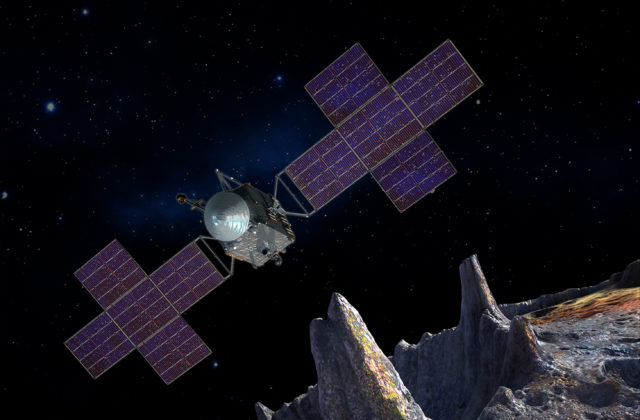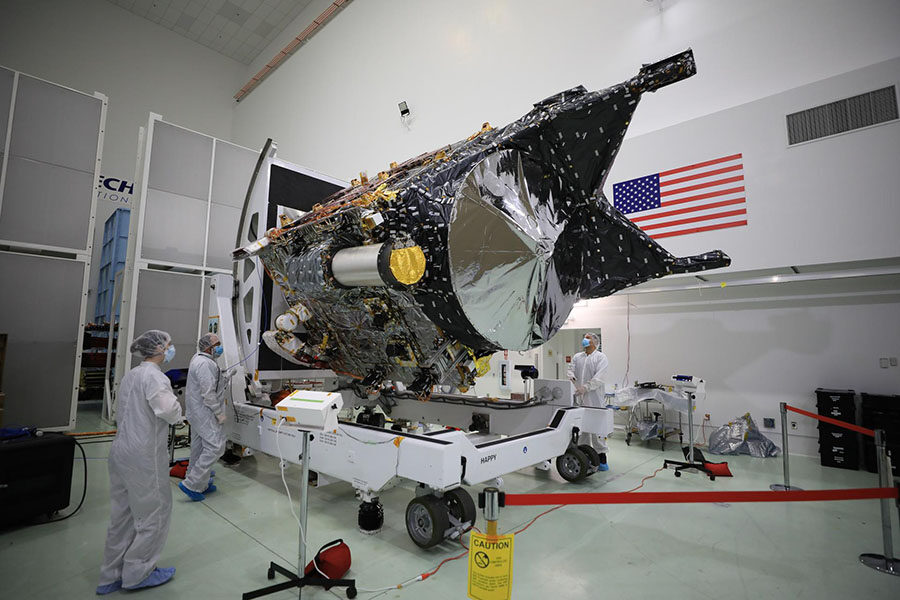After a year’s delay, NASA’s Psyche mission to the metal-rich asteroid of the same name is on track for a launch in October 2023.

NASA
“Psyche is on a positive course for an October 2023 launch. Launch readiness date is credible, and overall probability of mission success is high.” So stated Tom Young, chair of the Psyche Independent Review Board (IRB), during a telephone press briefing today. The Board was convened by NASA last summer after Psyche’s Jet Propulsion Laboratory (JPL)–based mission management admitted to NASA that the spacecraft would not be ready to launch for the metal-rich asteroid of the same name by August 2022, as originally planned.
The IRB’s review of Psyche revealed that the causes of the launch delay went far beyond the Psyche mission. Last November, the IRB delivered a report that sharply criticized JPL’s own institutional management and its oversight by Caltech. The IRB found issues with insufficient staffing, workforce retention, internal communications, management oversight, and more. These problems not only contributed to the failure to meet Psyche’s launch date but threatened many other missions under construction at JPL, including the Earth-observing NASA-Indian Space Research Organization Synthetic Aperture Radar (NISAR) mission, the Venus Emissivity, Radio science, InSAR, Topography, And Spectroscopy (VERITAS) orbiter, and Europa Clipper.
In response to the November IRB report, NASA halted work on VERITAS to relieve pressure on JPL’s overstretched workforce, throwing future Venus exploration plans for both NASA and ESA into disarray. NASA gave new JPL Director Laurie Leshin five months to turn the ship around before the Board would check in again. The IRB delivered their assessment of JPL’s progress to NASA on May 30th and released their report to the public today.
Both JPL and the Psyche team “totally exceeded expectations” in that time, Young said in today’s briefing. “The IRB recognized that JPL institutional recommendations would take considerable time to complete,” and while there is “an extreme amount of work to go” in some areas, “progress was most impressive.”
For example, NISAR was delivered on time, and aggressive recruiting and retention efforts have now fully staffed the Psyche and Europa Clipper teams. (Among other improvements, JPL now offers, for the first time, 8 weeks of paid parental leave.) As for Psyche, Leshin reported that the Psyche team “is very nearly through all the key software testing that was the major reason for the delay.” With 18 weeks remaining until launch, there are 7 weeks of margin.

NASA / Ben Smegelsk
It’s deeply unfortunate that JPL’s management problems, not the technical challenges of exploring space, have caused a year’s delay to the Psyche mission and at least four years’ delay to VERITAS, two of only four NASA missions ever to be awarded to teams led by women principal investigators. Lindy Elkins-Tanton will get to see her team’s mission launch in October of this year, but the lengthy delay to VERITAS prevents it from serving its planned-for reconnaissance role prior to the arrival of NASA’s DAVINCI atmospheric probe and ESA’s EnVision orbiter. Time will tell whether NASA will consider VERITAS to be justifiable — or even supportable — once it’s overlapping in time with DAVINCI and EnVision.
 0
0
Comments
You must be logged in to post a comment.